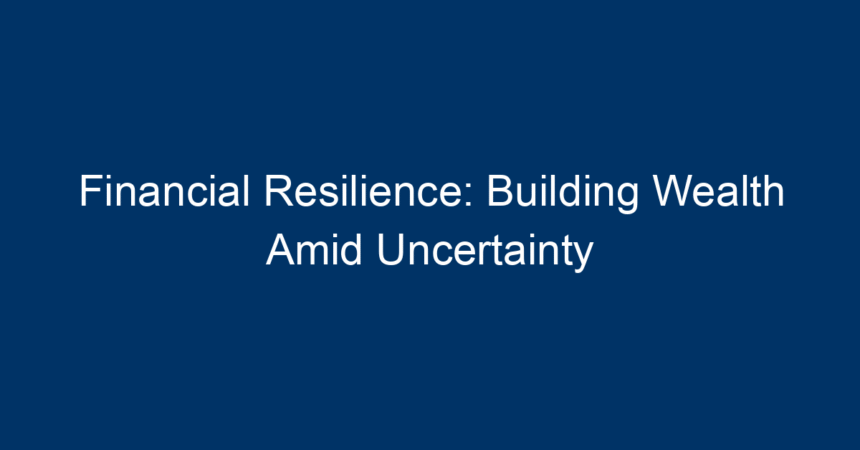In today’s fast-paced world, uncertainty has become a constant companion. With economic fluctuations, global events, and personal financial challenges, building financial resilience has never been more essential. But what does it mean to be financially resilient? It’s not merely about having a large savings account; it’s about developing habits and strategies that empower individuals to adapt, thrive, and cultivate wealth regardless of external conditions. This article delves into financial resilience, exploring actionable steps to build wealth even amid uncertainty, ensuring you are prepared for whatever challenges life throws your way.
Understanding Financial Resilience
What is Financial Resilience?
Financial resilience refers to the ability to withstand financial shocks and adapt to unforeseen circumstances. This concept encompasses not just managing current resources effectively but also planning and preparing for the future. A financially resilient individual can navigate turbulent economic times, avoid the pitfalls of debt, and work towards building sustainable wealth.
Why is Financial Resilience Important?
In times of crisis—whether it’s a global pandemic, an economic recession, or personal financial setbacks—those with high financial resilience experience less stress and greater stability. They can adapt their spending, find new income sources, and even recognize opportunities in adverse situations. Understanding and enhancing your financial resilience can lead to better mental health, deeper confidence in decision-making, and a more secure future.
Building Blocks of Financial Resilience
1. Create a Robust Emergency Fund
An emergency fund is the bedrock of financial resilience. It acts as a safety net, allowing you to manage unexpected expenses without resorting to credit cards or loans.
-
How Much Should You Save? Aim for three to six months’ worth of living expenses. This cushion provides peace of mind during emergencies.
- Where to Keep Your Emergency Fund? Choose a high-yield savings account, which can offer better interest rates than traditional savings accounts and ensure quick access to cash during emergencies.
2. Diversify Income Streams
Relying solely on a single income source can be risky, especially during economic downturns. Diversifying your income streams can bolster your financial resilience.
-
What Are Some Ways to Diversify? Consider freelance work, online businesses, investments in real estate, or passive income sources like dividend stocks.
- Skill Development: Invest in learning new skills that can open doors to new job opportunities or side gigs.
3. Build a Strategic Budget
A well-crafted budget is crucial for financial stability. It helps you track income, expenditures, and savings goals.
-
Zero-based Budgeting: Allocate every dollar of your income to specific expenses, savings, or debt repayment to maximize the utility of your money.
- Adaptable Budgets: Be ready to modify your budget during changing circumstances, ensuring it reflects your current financial landscape.
4. Invest in Financial Literacy
Financial literacy is the foundation of financial resilience. The more you know, the better equipped you are to make informed choices.
-
Educate Yourself: Read books, take online courses, or attend workshops on budgeting, investing, and personal finance.
- Stay Updated: Keep abreast of economic trends and news, as this knowledge can help you anticipate changes and adapt your strategies accordingly.
5. Protect Your Assets
Financial resilience isn’t just about accumulating wealth; it’s also about protecting what you have.
-
Insurance: Ensure you have adequate health, auto, home, and life insurance coverage. This protection helps shield you from significant losses that could derail your financial stability.
- Estate Planning: Having a will and estate plan in place is crucial for ensuring your assets are distributed according to your wishes and can prevent unnecessary financial strain on your loved ones.
The Role of Mindset in Financial Resilience
Cultivating a Growth Mindset
Financial resilience also deeply ties to your mindset. Adopting a growth mindset enables you to view challenges as opportunities for learning and growth.
-
Embrace Learning: When faced with financial challenges, focus on lessons learned instead of the setbacks.
- Stay Positive: Positivity fuels resilience. Surround yourself with supportive networks, whether friends, family, or financial advisors. Their encouragement can help you stay on track during difficult times.
Practical Strategies for Wealth Building
1. Start Investing Early
Investing is one of the most effective ways to build wealth over time, thanks to the power of compound interest.
-
Types of Investments: Explore stocks, mutual funds, real estate, or bonds, depending on your risk tolerance and financial goals.
- Automate Investments: Set up automatic contributions to investment accounts to ensure consistent saving and investing, even during uncertain times.
2. Focus on Retirement Savings
Don’t overlook retirement savings. Contributing to a retirement account can serve as a long-term wealth-building strategy.
-
Employer-Sponsored Plans: If your employer offers a 401(k) or similar plan, take advantage of it, particularly if they match contributions.
- Invest in IRAs: Individual Retirement Accounts (IRAs), whether traditional or Roth, offer tax advantages that can amplify your savings.
3. Regularly Review and Adjust Financial Goals
Financial resilience requires ongoing assessment and flexibility.
-
Set SMART Goals: Ensure your financial goals are Specific, Measurable, Achievable, Relevant, and Time-bound.
- Review Regularly: Quarterly or bi-annual reviews of your financial situation can help you stay aligned with your goals and adjust strategies as necessary.
Concluding Thoughts: Actionable Insights for Achieving Financial Resilience
Bouncing back from financial setbacks is an essential skill in today’s unpredictable landscape. By building financial resilience, you can form a solid foundation for wealth that endures amid uncertainty. Here’s a summary of actionable insights to consider:
-
Establish an Emergency Fund: Prioritize three to six months of expenses in a high-yield savings account.
-
Diversify Income: Explore multiple streams of income to insulate against job loss or economic downturns.
-
Budget Wisely: Implement a flexible, zero-based budget to account for your income and expenses.
-
Boost Financial Literacy: Engage in continuous learning to enhance your understanding of personal finance.
-
Insure and Protect: Invest in insurance and estate planning for safeguarding your assets.
-
Adopt a Growth Mindset: Embrace challenges as learning opportunities and maintain a positive attitude.
-
Start Investing: Take advantage of compound interest through early and consistent investments.
- Review and Adjust: Regularly evaluate your financial goals and adapt as necessary.
By taking these steps, you’ll cultivate not only financial resilience but also a path toward long-term wealth, empowering you to navigate through the uncertainties of life with confidence and security.




